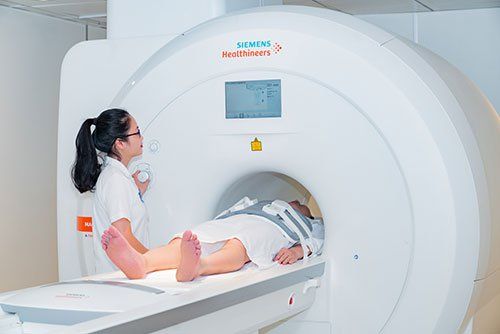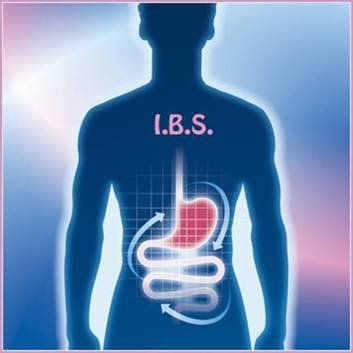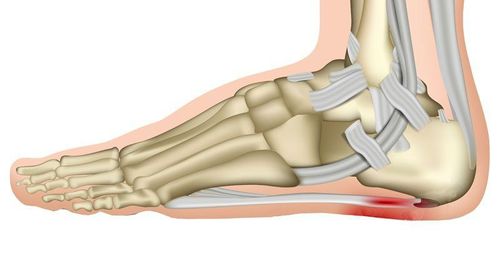This is an automatically translated article.
Posted by Master, Doctor Mai Vien Phuong - Department of Examination & Internal Medicine - Vinmec Central Park International General HospitalAn estimated 10-15% of American adults have irritable bowel syndrome. However, only half of them receive a diagnosis and seek medical attention. A proper diagnosis from a medical professional is important for obtaining appropriate treatment and palliation.
IBS is a collection of symptoms, not a well-defined physical condition. Symptoms vary from person to person. This makes IBS difficult to diagnose. To help make an accurate diagnosis, your doctor may use a variety of tests.
1. The Most Common Symptoms of Irritable Bowel Syndrome.
Abdominal pain
One of the most common symptoms of Irritable Bowel Syndrome is abdominal discomfort or pain. You may have stomach cramps after eating. It may be better after you have a bowel movement.
Bloating in your belly
If your stomach feels bloated all the time, it could be a sign of Irritable Bowel Syndrome. Fullness makes your midsection feel tight and full. Your abdomen may also be visibly swollen.
Bloating or bloating
Irritable bowel syndrome often causes bloating, or gas. Certain foods and drinks can make this symptom worse. For example, you may experience bloating after eating: beans, cabbage, any type of dairy product, foods high in fat, such as tallow, cheese and deep-fried products, beverages contain caffeine, alcohol or artificial sweeteners.
Changes to your stool
Irritable bowel syndrome can cause changes to your bowel and stool habits, including constipation and diarrhea. It can also cause the appearance of mucus in your stool. You may have diarrhea or constipation or they may be interchangeable.

You may have constipation related to Irritable Bowel Syndrome (Constipation Irritable Bowel Syndrome) if you:
Need to strain to pass bowel movements Less than four times per week Pass hard stools, lumpy and dry diarrhea If you have loose stools several times a day, you may have diarrhea associated with Irritable Bowel Syndrome if. It can also cause a sense of urgency when you need to have a bowel movement. Mucus in your stool Mucus in your stool is another potential sign of Irritable Bowel Syndrome. Mucus is a clear liquid that protects and coats the tissues in your digestive tract. With Irritable Bowel Syndrome, you may pass mucus, along with stools.
2. MRI (magnetic resonance tomography) technology in irritable bowel syndrome
MRI technology opens new doors to a new understanding of irritable bowel syndrome and changes in diet that can help people with irritable bowel syndrome.
Doctors today must rely on X-rays and patient descriptions of their symptoms to diagnose irritable bowel syndrome (irritable bowel syndrome). But scientists at the University of Nottingham's Center for Digestive Diseases in the UK have discovered a new way to investigate disease using MRIs, which could affect the way doctors diagnose and treat the condition. irritable bowel syndrome in the future.
Irritable bowel syndrome is a functional digestive disorder caused by changes in the way the digestive tract works. The most common symptoms are diarrhea, constipation, gas, bloating, and chronic abdominal pain. Irritable bowel syndrome can be diagnosed if a patient experiences one or more of these symptoms at least three times a month for a period of three months or longer, according to the National Digestive Diseases Information Service.
However, because the causes and symptoms of irritable bowel syndrome vary from person to person, it can be difficult for a doctor to treat.

3. A New Method for Diagnosing Irritable Bowel Syndrome
Nottingham researchers conducted three separate studies of the gut. In the first, published online in Neurogastroenterology and Motility, the scientists were able to image the colon and divide it into three functional regions.
The ascending colon is a storage and fermentation area, where unabsorbed food residues will be broken down by bacteria. The transverse colon is the place to store the waste products left over from the bacteria processing, while the descending colon pushes waste down and out of the body.
Using MRI scans, scientists were able to measure the volumes of these three regions of the colon in irritable bowel syndrome patients in a way that has never been done before, allowing them to compare the movements of colon with normal healthy bowel movements.
They found that in patients with irritable bowel syndrome, the ascending colon does not dilate as much to make room for meals as it does in healthy individuals.
In the second study, also published in Neurogastroenterology and Motility, researchers fed volunteers specially designed markers that are visible on MRI scans to measure the time it took food to travel. through the intestines. Scientists were able to image the intestines over a 24-hour period to see how far the MRI markers had moved.
According to the researchers, this method can help doctors assess whether a patient has normal or slow bowel movements. It is also an ideal method for children or young women who may become pregnant and should avoid exposure to radiation from X-rays.

4. Uncover the Mystery of Irritable Bowel Syndrome
Stephen Wangen, ND, co-founder and Medical Director of the Irritable Bowel Syndrome Treatment Center in Seattle, says MRI scans can provide an objective way for doctors to measure irritable bowel syndrome , but it does not pinpoint the exact cause of irritable bowel syndrome .
Wangen said in an interview with Healthline: “In this latest study, they found that MRI can measure changes in the colon related to the length of time patients experience irritable bowel syndrome. . “These changes are interesting, but remember that they are symptoms of irritable bowel syndrome. Changes in the colon occur as a result of irritable bowel syndrome, not the other way around. They should not be confused with information explaining what is causing irritable bowel syndrome.”
But progress is being made in other areas, says Wangen.
He said: “The medical community is slowly starting to realize the great importance the gastrointestinal ecosystem plays in health.
By looking at the amount and type of bacteria living in each patient's gut, future doctors can manipulate these gut microorganisms to help the digestive tract work more smoothly.
The future of irritable bowel syndrome is about acknowledging the uniqueness of each patient and the important impact of diet on both this ecosystem and on inflammation,” says Wangen. “It's not just about individual nutrients, it's about whole foods and how your body responds to it. Understanding these issues is key to curing irritable bowel syndrome.”
Conclusion
If you have persistent abdominal pain, bloating, gas, diarrhea, constipation or mucus in your stool, see your doctor. These symptoms could be signs of Irritable Bowel Syndrome, a condition that can affect your large intestine. Your doctor can help determine the cause of your symptoms and recommend a treatment plan. If you have Irritable Bowel Syndrome, you can manage your symptoms with a few lifestyle changes. Your doctor may also recommend medications, supplements, or other treatments.

Currently, Vinmec International General Hospital is a prestigious address trusted by many patients in performing diagnostic techniques for digestive diseases, short bowel syndrome, chronic diarrhea, Crohn's disease , misplaced gastric mucosa in the esophagus, reflux esophagitis...
Vinmec Hospital with modern facilities and equipment and a team of experienced experts, always dedicated to treatment patients, customers can rest assured with gastroscopy and esophagoscopy services at Vinmec International General Hospital.
Please dial HOTLINE for more information or register for an appointment HERE. Download MyVinmec app to make appointments faster and to manage your bookings easily.














